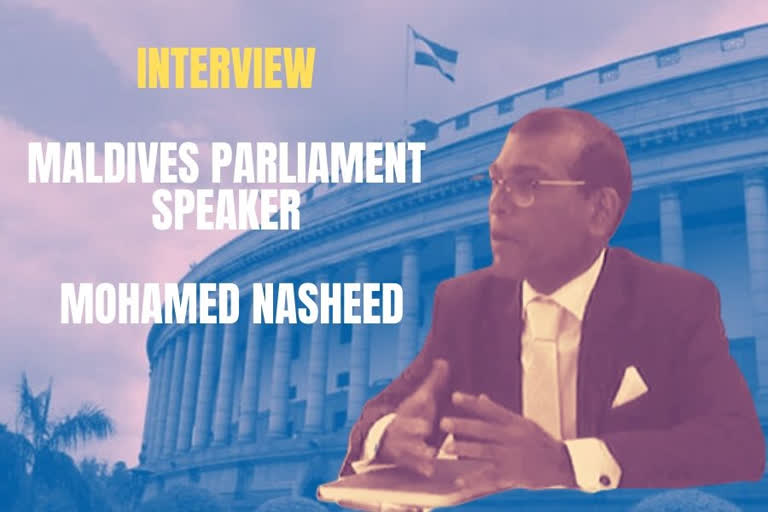New Delhi: Tension seems to be brewing afresh in the island nation of Maldives with its former president and now speaker of the Majlis or parliament Mohamed Nasheed upping the ante on China.
Unlike President Ibrahim Solih and his foreign minister Abdullah Shahid who have been making cautious statements on Beijing to avoid upsetting it, Nasheed on Friday minced no words and compared Chinese ‘land grab’ to the colonial East India Company.
The prominent Maldivian leader, who was forced to live many years in exile and could not contest the 2018 elections in which his party MDP returned to power in a surprise win with Solih as the opposition presidential candidate, was in India on his first visit since taking charge as Speaker.
Talking to media after his meetings with PM Modi and other leaders, Nasheed said that China structures its loans or development assistance deliberately in a way to trap smaller nations into debts.
He urged that China must restructure the debts that the small but geostrategically important nation on the Indian Ocean owes it.
“China has grabbed more land than the East India Company. They have not given development assistance to us. It was a debt trap. We must now get the contracts done. We can’t stop that. We have to pay the bill. But the Chinese government must restructure the debt,” said Nasheed.
Nasheed added that the island nation which is dependent heavily on tourism owes China nearly 3.5 billion USD for the infrastructure projects including bridges and roads built by Beijing under the previous regime of dictatorial President Yameen.
“It is impossible to pay back the loans. The money never came to us. But we have a big bill to pay and we will pay the bill. Not many politicians (in the Maldives) pay for it,” he said.
The first democratically elected former President who had challenged his ouster in a coup and exile in an international court cautioned that over the next few years if China does not do course correction on the debt traps, Maldives could consider dragging it to international arbitration for human rights.
He called the Free Trade Agreement (FTA) signed by the Yameen regime and bulldozed through its Majlis in the absence of any opposition in 2018 as ‘dead’.
“The FTA is dead and it now requires Parliament’s approval and it will not be approved... What China did we see it as imperialism, as colonialism and as land-grab,” said Nasheed.
Asked if there was a palpable difference with Nasheed going all guns blazing at China but the Presidency doing the tight rope walk between New Delhi and Beijing, Nasheed played down the ‘internal contradictions’ saying he is ‘not disappointed’ and having run the country previously he understands that things play out differently in ‘realpolitik’ compared to campaign rhetoric.
Earlier In his meeting with PM Modi earlier Nasheed requested India to ‘fast-track’ development projects undertaken in the Maldives under the 1billion USD credit line extended.
In his deliberations with his parliamentary delegation while In India, Nasheed also raised concerns about radical Islamism and challenges of Islamic State with links to Al-Qaeda fishing in Maldivian waters.
In the past few years, some 250 people from the Maldives are estimated to have joined the ranks of IS as fighters. Asked about Muslim majority nation Malaysia providing shelter to controversial hate preacher Zakir Naik, Nasheed expressed concerns and added that the televangelist wanted by India has been denied entry into the Maldives.
In exclusive remarks to ETV Bharat, Nasheed also defended the Indian government position on the Citizenship Amendment Bill. “It is an issue for internal Indian politics. It has nothing to do with us. We do trust the Indian democratic system. When your parliament does something we believe it would have gone through a proper process. I understand that this was a pledge that the government made in their manifesto.
One of the reasons why you get elected is to deliver on the manifesto,” said Nasheed about the bill which has sparked off violent protests across several states in the North East and is seen as discriminatory to minority Muslims.
Talking to this Correspondent Nasheed also emphasised that while a mechanism for regional co-operation is very much needed, the future of SAARC though looks dismal.
He suggested holding the next SAARC summit in the Maldives as a way out. Led by India, the South Asian neighbours have boycotted the SAARC summit which was to be held in Islamabad in 2016 in wake of the Uri terror strikes and the impasse continues.
“It is very difficult to continue. Unless we find another arrangement on regional cooperation it is going to be very difficult for us to continue with SAARC. I do not think the next summit is happening unless you have all the SAARC summits in the Maldives. It is getting difficult to find a venue where every leader is comfortable to go. I think it is not moving and must seriously rethink about SAARC, bring it to the drawing board and see what can be done about it,” said Nasheed.



